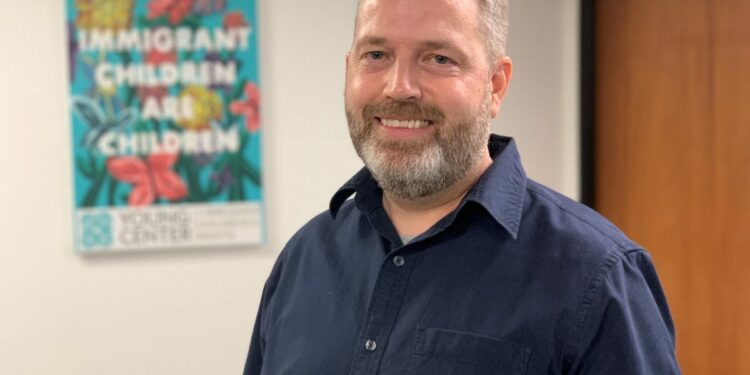Republican VP nominee JD Vance gives speech at AZ campaign stop
Republican VP nominee JD Vance (R-Ohio) gives a speech focused on immigration and fentanyl during a campaign stop at the Arizona Biltmore Resort.
Charles Rogers recalled watching on the news when during a stretch from December 2018 to May 2019 at least seven migrant children had died while they were in the federal government’s custody along the U.S.-Mexico border.
He had traveled to Latin America for his job over the past 20 years and had become familiar with some of the challenging conditions that had forced children and their families to leave their homes and make their way to the United States.
“They were trying to escape that kind of situation to survive. And then, the end of their story was before it even had started,” Rogers said.
Encouraged to find a way to do something, he heard about a volunteer program with the Young Center for Immigrant Children’s Rights. He looked into it a decided to become a child advocate for unaccompanied minors.
“A big part of being an advocate is just showing up, being a consistent presence in these kids’ lives, and really understanding who they are and what they want for themselves,” Rogers said. “And, you know, just helping them to understand that there are people out there who care about them.”
The number of unaccompanied children arriving to the U.S. has fluctuated over the past few years, since it peaked in April 2021. Because they are underage, unaccompanied migrant children are mostly exempted from policy crackdowns and restrictions at the border like the June restriction on access to asylum in between border crossings.
Though numbers are not as high as they were three years ago, the number of children arriving to the border has remained steady. And there’s anecdotal evidence that as crackdowns make crossing the border harder, some families are instead choosing to send their children alone to increase the odds they’ll make it to the U.S.
Once they reach the U.S.-Mexico border, Customs and Border Protection officials will process them and transfer them to the custody of the U.S. Department of Health and Human Services Office for Refugee Resettlement if they’re not from Mexico. The department reported that it had 6,469 unaccompanied minors in its care by the end of July, the most recent data available.
That kicks off a long and arduous process for migrant children seeking asylum or other immigration relief to stay in the United States. And that process is full of risks and complications.
That’s because at least two other federal agencies are also involved in the care of unaccompanied migrant children: Immigration and Customs Enforcement monitors their release from government custody, while the Department of Justice’s Executive Office for Immigration Review adjudicates their cases.
While in the federal government’s custody, minors could fall victim to sexual abuse and harassment, as detailed in a Department of Justice lawsuit filed in July against Southwest Key. The nonprofit operates 29 short-term housing facilities for unaccompanied minors in Arizona, Texas and California.
The lawsuit accuses Southwest Key of not doing enough to protect minors from abuse or harassment from staff hired to care for them. Prosecutors are seeking compensation for the victims listed in the lawsuit, though the case is in the early stages.
Challenges for unaccompanied children extends beyond their time in federal custody. Last month, a government watchdog alerted that ICE is unable to track all of the migrant kids released to family or sponsors.
The DHS Office of the Inspector General found that ICE could not appropriately locate 32,000 children released from HHS custody that failed to show up at their immigration court hearings, out of 448,000 kids referred to HHS custody between 2019-2023. The report says the migrant kids “who do not appear for court are considered at higher risk for trafficking, exploitation, or forced labor.”
“Part of our effort to fight for justice for these children and their families requires us all to recognize the ways our country’s immigration policy increasingly values ‘curbing’ immigration more than protecting human life,” Gladis Molina Alt, the executive director of the Young Center, said its annual report published in June.
Community and legal nonprofits like the Young Center have stepped in to help fill some of the gaps and look out for the best interests of migrants kids. Their child advocate program allows volunteers like Rogers to help minors navigate the immigration process and recruits volunteers on a rolling basis around the country. They must pass a background check, and training includes navigating trauma.
“The most important thing is to empower these kids to know that they have control over certain things,” Rogers said.
Source link : http://www.bing.com/news/apiclick.aspx?ref=FexRss&aid=&tid=66e918ff8e564f459de3a670a7d3873d&url=https%3A%2F%2Fwww.tennessean.com%2Fstory%2Fnews%2Fpolitics%2Fimmigration%2F2024%2F09%2F16%2Fprogram-seeks-volunteers-to-advocate-for-unaccompanied-minors%2F75072494007%2F&c=17985744312407089322&mkt=en-us
Author :
Publish date : 2024-09-16 02:01:00
Copyright for syndicated content belongs to the linked Source.








